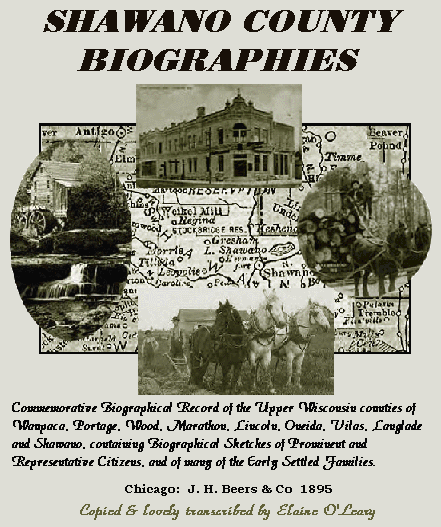
Pgs 765-66
C. P. E. LUTZ, superintendent
of the M. L. O. H. at Wittenberg, Shawano county, was born in Germany,
June 14, 1849, and came of a prominent family there. His father, Judge
Ferdinand Lutz, was a man of good education and fine position. He died
in Germany, in 1851, and his wife survived until 1894. In the family were
twelve children, five sons and seven daughters. One son, Ferdinand, was
first mate on the vessel "Veritas," which went down on the Chinese coast
with all on board. Two other brothers, Herman and Bernard, were officers
in the Austrian army, and the fourth brother, Adolph, was a physician.
Mr. Lutz was the eleventh child of the family. At the age of
four he entered the kindergarten, and at ten entered college at Goettingen,
the University of Hanover, and began studying languages. When he was fifteen,
years of age his sailor brother returned home and stimulated our subject's
desire to see the world, so he shipped from Hamburg on a ship as a cabin
boy, and for four years followed the sea. He visited Cape Town, Madras,
Rio Janeiro, Porto Rico, and most of the large seaports of Europe, and
has therefore seen much of the world. He had intended going to a navigation
school, but the political difficulty in 1866 in Hanover led to the alteration
of his plans. Owing to his fatherís merits, his widowed mother and her
family were supported by the King of Hanover, George I. Instead of
entering the Prussian navy, Mr. Lutz came to the United States, sailing
from Bremen in November, 1868, on the "Columbus", which reached New York
after one hundred and sixteen days. He paid the expenses of the voyage
with money which he had himself earned. His destination was White Hall
Station near Allentown, Penn., where a friend had told him he could secure
work. He was employed in a stone quarry for a month, and also worked on
a gravel train, after which he went to New York and clerked in a grocery
and bakery. He was employed in the same capacity in Newark, N. J., and
in June, 1869, went to Lyons, Iowa, where two of his former shipmates were
then living. He first found employment in a sawmill and lumber yard, but
after a short time became an instructor in a Lutheran school. In the fall
of 1871 he entered a normal school of Addison, Ill., where he was graduated
in June, 1873, and was thereby fitted for teaching in the Lutheran Church
Congregation School, near West Point, Neb. He remained in charge of that
school from September, 1873, until Easter, 1875.
During his residence there Professor Lutz was married March
30, 1875, at Stanton, Neb., to Augusta Schultze, a native of Prussia, born
November 17, 1855. She came to the United States with her parents in 1870.
Her father, Carl L. Schultze, was a carriage and wagon manufacturer in
his native land, but in this country followed farming. Eight children have
been born to Mr. and Mrs. Lutz: Paulina and Theresa, at home; Edmund, who
died at the age of two years; Adolph; Ferdinand, Carl, Dorothea and
Alphonso, still under the parental roof.
In April, 1875, Professor Lutz accepted a position as teacher
of a parochial school in Cleveland, Ohio, at that time a branch of Zion
Congregation, where he remained for thirteen years, after which he spent
two years at the head of a school in Bedford, Ohio. In 1884 he revisited
Germany, spending three months amidst the scenes and friends of his youth.
On the 5th of August, 1889, he accepted a call to Sheboygan, Wis. and there
continued until February 24, 1892, when he came to Wittenberg, having accepted
a call as Superintendent of the Martin Luther Orphans' Home. This was built
in 1885 by the Lutheran Church, and is supported by it. Here one
hundred and twelve orphans are cared for until the age of eighteen. It
is an excellent institution, well worthy the support and commendation of
all good people, and the scholars are making rapid progress under the able
management of Mr. Lutz. He and his wife are faithful members of the Lutheran
Church. He is a highly educated man and in his chosen work is meeting with
excellent success. |